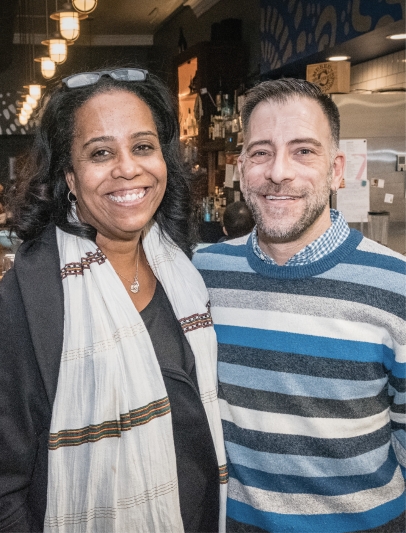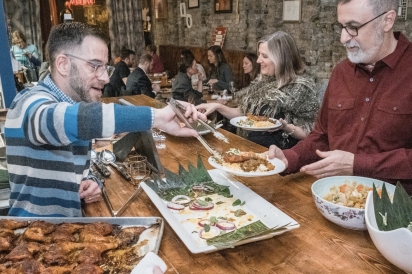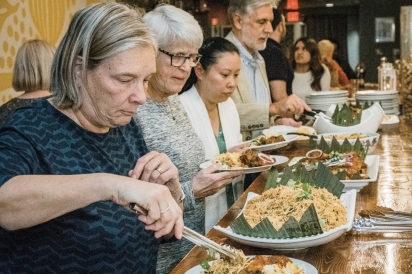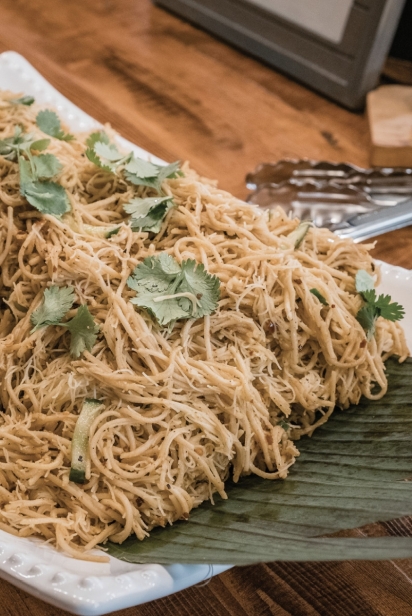In Pursuit of a Different Life: Refugee Chefs in Wisconsin
When asked what spices he and his wife rubbed on their Tandoori chicken legs, Chef Point was covert: “Secret recipe.”
Point and Susan are Burmese Muslim refugees who showcased their tastes during a pop-up dinner at Amilinda in November of 2019 as part of the Tables Across Borders dinner series. At their request, their names have been changed and no identifiable photos were taken because of the risks of escaping Myanmar, formerly known as Burma. They’re afraid for the safety of their families who are still living there, with good reason.
Refugees are forced to leave their home countries because of conflict, violence and/or religious, ethnic and political persecution. Many live in limbo for years in camps while they apply for refugee status, an official label. Unlike immigrants, refugees do not have a choice where they resettle after their refugee status is granted. Oftentimes, refugees must rebuild their lives and renew a sense of normalcy in a country where they do not know the language and culture.
Tables Across Borders creator Kai Gardner-Mishlove has helped refugees acclimate to the U.S. over the last decade. Refugees invited her into their homes, and she traveled the world eating their incredible meals. Humbled by refugees’ openness to share their culture, she wanted to bring that global food tour to the public.A friend, Saehee Chang, put Gardner-Mishlove in touch with restaurant owners who were glad to partner with Tables Across Borders and let refugee chefs use their kitchens with the inaugural dinner commencing in February of 2019. Ten ticketed pop-up dinners have been held at local establishments Amilinda, (owned by Greg and Orry León), Tricklebee Café (owned by the Rev. Christie Melby-Gibbons) and The Tandem (owned by Caitlin Cullen).
“The purpose is to raise awareness of positive contributions of our new neighbors, build bridges and promote entrepreneurship,” Gardner-Mishlove said. An added bonus, all ticket sales go to refugee chefs.Diners enjoyed Ethiopian, Congolese, Syrian, Serbian, Eritrean, Burmese, Somali and Venezuelan cuisine, as well as the food of Karen and Rohingya: ethnic groups originally from Burma. Burmese food is a fusion cuisine with influences from China, India and Thailand. At Point and Susan’s pop-up tandoori chicken, lamb curry with potato, stir-fried vegetables, Burmese noodle salad, cucumber salad and biryani rice perfumed the restaurant. The couple served sweet sooji or semolina pudding for dessert.
“We would love to open a restaurant and share our food,” Point and Susan said in a Q&A with Gardner-Mishlove and an interpreter, posted on the Tables Across Borders Facebook page.
In his early 20’s, Point paid his dues at famous Chef Wolfgang Puck’s Spago in Malaysia. “I learned many styles of cooking from wonderful chefs. My wife and I worked at many 5-star hotels and learned fine dining,” he said. “I started cooking at seven years old,” Susan said in the Q&A. “I watched my mother in the kitchen. I always loved cooking and she was my inspiration for cooking many family recipes!”
Out of 70.8 million forcibly displaced people worldwide, 25.9 million are refugees, according to the office of the United Nations High Commissioner for Refugees (UNHCR), which works to protect and assist refugees all over the world.
Every year, the president, in consultation with Congress, decides the ceiling for refugees to be admitted into the country. “The U.S. Department of State, which operates the U.S. Refugee Resettlement program, expects to resettle up to 18,000 refugees in fiscal year 2020,” said Gina Paige, Deputy Communications Director for the Wisconsin Department of Children and Families that oversees the Refugee Programs Section.
In 2016, the ceiling was set to 85,000 refugees during President Barack Obama’s last year in office compared to 50,000 in 2017 (President Donald Trump’s first year in office), according to data compiled by the Migration Policy Institute.
Gardner-Mishlove explained that since the ceiling decreased significantly, some refugees declined having a pop-up because they feared the publicity and attention on them as refugees in the current political climate.
Before being allowed entrance to the U.S., refugees undergo extensive background checks and screenings, which can take around two years. Once refugees pass, the Department of State works with nine national resettlement agencies or voluntary agencies that place refugees in communities.
A local affiliate helps refugees with housing, food, clothing, assessing employability and places them in English as a Second Language classes and enrolls kids in school.
Paige shared that refugees typically get jobs in food production, warehouse/production, hotel housekeeping, cleaning, machine operation, landscaping and home care, citing employment outcome reports. The number of refugees who resettled in the city of Milwaukee in 2019 was 350, and at 248 people, the largest refugee population came from Burma, said Paige. The department is unable to differentiate by ethnic group. Wisconsin as a whole resettled 599 people in 2019.
For the Leóns, helping Point and Susan use Amilinda as a pop-up space was a given. Like Tables Across Borders, Amilinda started as a pop-up at The National, then owned by Nell Benton. From that momentum, the Leóns opened their own restaurant in 2015—the same year Point, Susan and their three kids arrived in Milwaukee.
“When we started Amilinda as a pop-up, if it wasn’t for Nell Benton of The National doing the same for us, we wouldn’t have a brick-and-mortar restaurant now,” Greg León said. “I’m fortunate enough to be in the position to help others, so why won’t I? It was never a question of if we would help each other, but when.”








